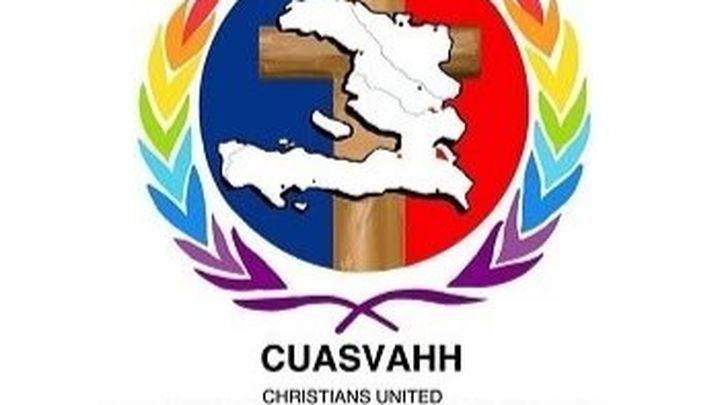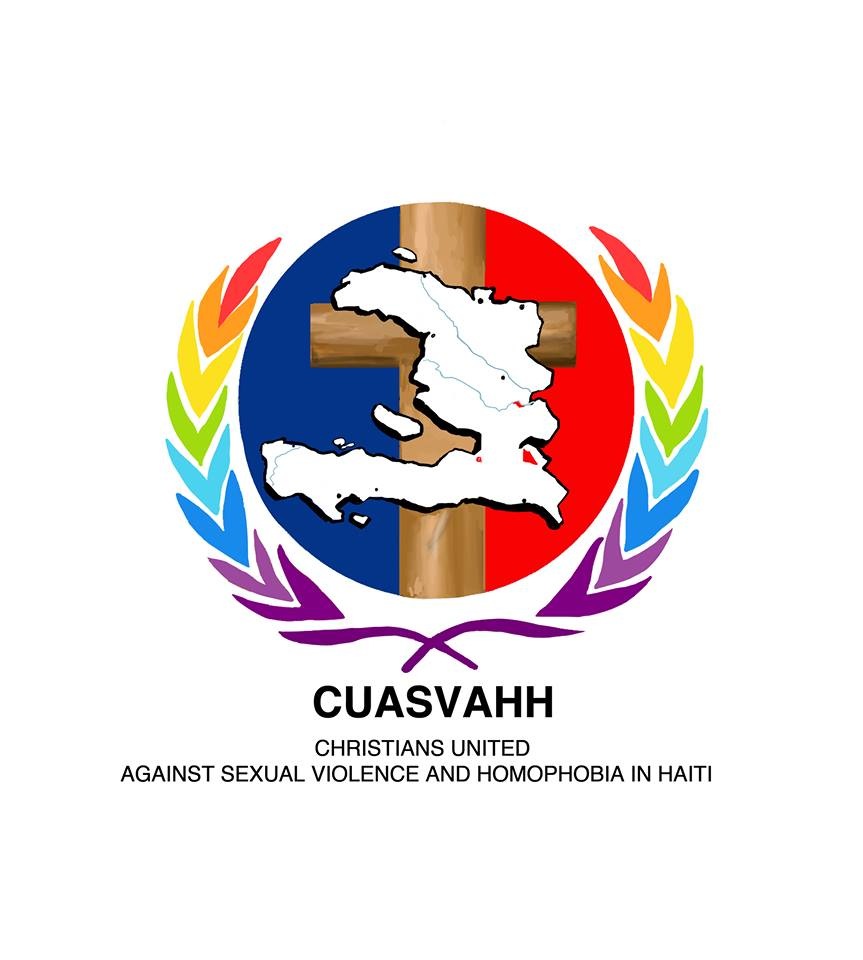
Immigrant Services Program 501 (c) 3
Disclaimer: The photo for our campaign is graphic but was necessary to convey the reality of child abuse in Haiti! A picture speaks louder than words!
We are a non-profit organization of people from many Christian faith traditions, and cultures committed to end sexual violence and homophobia in Haiti.
We respect all other religions and our Christian faith is one of love and tolerance!
Our official website www.cuasvahh.org was hacked and deleted 3 months ago. Since then we have been struggling to put it back together. The website represented many hours of volunteer work and the Board's one-time monetary donation.

The website enabled us to upload trainings, information and data that our volunteers in Haiti use to educated school children, teachers, preachers and groups about sexual violence and the danger of homophobia. It also provided a safe haven for the survivors of Sexual Violence and the Haitian LGBT community to speak of their faith, support eachother and share their stories.
This presentation is one example of the trainings we provide. Please donate so we could comtinue our work!
After the devastating earthquake of 2010 which killed over 300,000 people, many missionaries fed Haitian survivors with rice in one hand and homophobia in the other. Blaming the earthquake on the LGBT community. What ensued were killings, burnings and harrasment of that community all done under the Christian banner.
Also the Earthquake brought a staggering number of Sexual violence cases bad enough that it became an international concern and in Haiti there is no structure in place to really care for the victims, not even a number to call to report the crime.
Wikipedia reads:"Victim blaming is common in Haiti, which discourages people from reporting assaults against them.[5] Rape victims and their families are stigmatized, and being the victim of a rape is considered shameful.[10][11] Sometimes family and significant others abandon a victim.[11] Women and girls who have been raped often try to keep the fact a secret since not being a virgin reduces their marriageability.[10] This shame surrounding rape discourages reporting and contributes to the difficulty in garnering accurate statistics on sexual assaults.[11][3]
Due to the entrenched attitudes about women in the society, law enforcement personnel such as police and judges frequently do not take violence against women and children seriously and do not make great effort to enforce laws against it.[12]"
CUASVAHH has many projects like the one below which is the first video teaching Haitian kids the difference between safe and unsafe touch but our bank of skilled volunteers is limited to take it to completion. But least it can be prevention in a contry that has no system to even report this incidents in schools, home etc..
Therefore, CUASVAHH sets out: to educated children about safety, adult about the skills to handle and overcome sexual violence, men about being a part of the solution and women about rape culture and how to eradicate it.
Presentation like the one below speaks of ensès (incest) which is a subject very taboo in Haiti.
Incest is often regarded as a family matter, to be dealt with privately and more often than not, victims do not have a voice. Nobody comes to the rescue in these situations. There is no official number to call for help. If the victims remain in the situation, they are often blamed because for the majority of Haitians, the psyche of a victim/survivor remains an enigma. Haitians are not aware that incest can happen anywhere to anyone, by perpetrators who are often pillars of society.
This video is describing what is rape legally and debating our cultural perception of it
Rape is perceived as a person’s inability to control his/her desire, not as a power issue. There is no shame for the rapist in certain situations such as a man forcing his wife, his girlfriend and/or a drunk female into intercourse. The term “flagrant deli” requires that in order for a perpetrator to be prosecuted, the rapist must be caught red handed in the act. Rape were rampant in the tent cities, is still is in the few left, during home invasions and kidnappings. It is also very present in the homes, in the schools and in the churches.
Unfortunately, there are no rape kits done at the hospitals and coming forward with incidences of sexual violence, is often detrimental to the victim/survivor due to the views of Haitian society. Often you would hear: “she asked for it”, or “this little girl is promiscuous” , even when grown men are dating a young female child and little boys are way too afraid to even hint that anyone has violated them.
This subject of Sexual Violence in Haiti is too broad to cover here for the purpose of establishing CUASVAHH history. We will discuss it in depth in our trainings, webinars and future discussions.
You can find out a little more about us on www.facebook.com/cuasvahh.
or you can watch this video of an Haitian-American sharings his own story within his family
OUR HISTORY
Haiti Sexual Violence History in a Nutshell
The organization CUASVAHH, was founded as an answer to the increased rapes and sexual violence towards women, the flagrant and condoned culture of pedophilia, child molestation and incest in Haiti, and the harmful tendency to blame the victims. Being a child and female in Haiti can often present such dangers. Unfortunately, although all people should be protected by the Haitian Constitution against such violence, society too often turns a blind eye.
A common joke in Haiti goes as follow: a man said to his friend “ man, instead of having one 30, I’d rather have two 15” and the friend would laugh and agree. What this man is talking about is his preference for 15 years old children instead of a 30 years old woman. This story alone paints the picture perfectly. Haitian men are not punished for dating anyone under 18 and poverty makes the situation worse. Pedophilia is rampant, a 30 year old with a 16 year old is pedophilia! Now ask many Haitians and its a different story.
We have written a song to teach children the difference between save and unsafe touch! It is low budget due to our financial limitation but it is the first song in Haiti teaching children about this subject!
NOW LET'S TALK HOMOPHOBIA
Most uneducated and some mis-educated Haitians gladly equate pedophilia to homosexuality. This idea or belief seems to be repeatedly accepted throughout Haiti, further putting fear and hatred of homosexuals in the heart of the people. Pedophilia is a disease, it is a crime and is damaging physically and psychologically to innocent children, specifically young females and sometimes also involves children as young as infants. On the other hand, homosexuality is an “etat d’etre”, a consensual relationship between two adults and doesn’t hurt anyone.
Haiti homosexual history in a nutshell
The organization, CUASVAHH was founded as an answer to the increased violence and murder of homosexuals in Haiti in ythe past year. Many Haitians will desagree with this fact because it is not reported in the news. First, the news is not interested in an homosexual, 2nd the family will nber openly reveal that their kin was homosexual 3rd the crime will never be labelled a hate crime. Thus, if you are not part of teh LGBT community you migjt have this utopian idea that haiti is very tolerant and surelylike Jamaica. Nevertheless, being a homosexual in Haiti is not illegal and all people are protected by the Haitian Constitution against such violence. Yet, in the law exist a caveat namely "moral turpitude" which empowers the police to harass, molest, arrest and even beat up whomever they deem homosexual.
Many people like to claim that homosexuality is not part of their culture; many Haitians perpetuate this idea and believe that homosexuality is borrowed from the United States of America or from other developed countries. This is, of course false, because in the first place, homosexuality is not a cultural phenomenon but a biological occurrence. The Haiti of yesteryear had always embraced its homosexuals even if they were to live on the down low. The level to which society would embrace the individual would of course, be intertwined with the social class to which he/she belongs. This is Haiti for you. The wealthier you are, the more accepted you are.
On the other hand, homosexuality was always a taboo subject in Haiti; it was never openly dealt with or discussed. Yet, everyone knew of the homosexual man around the corner making the best food, the musician who played his instrument so beautifully, the singer with the sultry voice, the makeup artist so handsome that you ought to look at him twice, the two single old ladies around the way raising their nieces/nephews, the fabulous hairstylist whose hands are magical, or hot spots where the Lesbian, Gay, Bisexual and Transexual (LGBT) community would meet. Haiti was never unaware of its homosexuals.
Haitian LGBTs, when too apparent or flagrant, were often ridiculed and harassed if they were from the wrong social class. Now they are stoned to death, burnt, killed, persecuted and vilified as pedophiles and criminals. Their situation has gone from bad to worse. With the aftermath of the devastating earthquake of 2010 and the new developments regarding LGBT rights, certain international missionaries have found the perfect target to spread fear and hatred in Haiti. Homosexuals are blamed for the earthquake, and they are blamed for everything that is wrong with Haiti as they are perceived as an abomination to humanity.
These missionaries, as they serve the poor/needy Haitians with white rice on one hand, are with the other hand, serving an interpretation of the Bible and God that is full of hatred, calling for homosexuals to be put to death. This is not the Bible or the God I know, this is not the Bible and the God you know. God is love and in the Ten Commandments, “Thou shall not kill” or “love your brother as you love yourself” is too often forgotten.
Organizer and beneficiary
Lyne Verna
Organizer
Jacksonville, FL
Claire Verna
Beneficiary